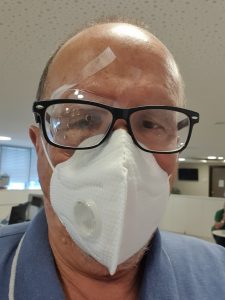With some of the corona-related bans having been lifted, I am out and about again. To be honest, even during the lock-down, I did my daily nine kilometer walk wearing one mask or another, all of them suffocating in the summer heat.
I have also started to work again, my clients apparently not haven given up on me despite Israeli media’s constantly harping on the over 65 crowd’s upcoming extinction. To be a journalist in Israel during corona, you need to be under 25, have a microphone, and suffer from a panic disorder.
Many stores near my home have folded. Those which have not folded are empty, or lines form outside so that only a number of clients can enter. Shopping is a nightmare ; the mood in public spaces is grim.
The dysfunction of our government is transparent-contradicting directions, finger pointing to shift blame, and a gross lack of personal example in leadership. The political crust of our society is pure scum, the bottle of the barrel. It is shocking, but not surprising; this is certainly not limited to Israel.
All adult education takes place on line and as an adult-education junkie, I can bear about two hours of online learning a day, and that’s it. The best lectures I have heard over the last few weeks are “Stalin’s use of religious symbolism in Soviet propaganda”, and “Jews and Arabs in the Palestinian Police in the 1930’s”. Yes, esoteric. I know. And I have also started reading a lot about the pied noir of Algeria and Harry’s Truman’s presidency.
I have met with family and friends at restaurants, eating outside. Menus are digital; staff is semi compliant with regulations; and fear is looming in the air.
We are presently experiencing the second wave of corona, with about 200 cases a day in a country with 9 million people. But there will be no more curfew, because the economy cannot take another blow. In many ways, the economy is out on its feet yet stumbling along.
However, it is infinitely better than it was during the shut down and “זה מה שיש”-that’s what there is.




